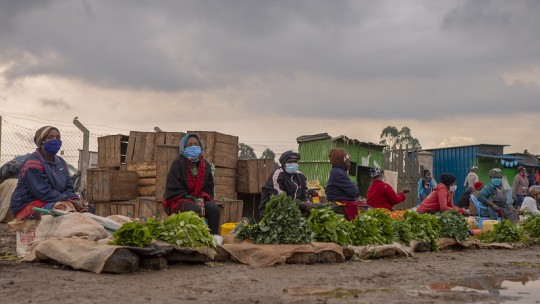What lessons can we learn from COVID-19 responses in African cities?
- Author(s): David Dodman

For low-income residents in African cities, the COVID-19 pandemic has often been experienced less as a health crisis and more in terms of the devastating socioeconomic, political and violent impacts arising from lockdown measures and other responses.
As part of the Covid Collective, research projects led by IIED and the Global Development Institute (GDI) have been analysing responses to the COVID-19 crisis across a number of African cities.
At African Cities Research Consortium’s recent meeting in Nairobi, researchers from Harare, Kampala, Lilongwe and Nairobi presented their Covid Collective findings, along with key lessons learned and recommendations for future pandemic preparedness.
Common themes
Despite clear differences in responses to the pandemic, some similarities were apparent across the focus cities. Five common themes emerged:
1. Informality multiplied COVID-19’s impacts in informal settlements
COVID-19 often acted as a threat multiplier, with negative impacts on health, wellbeing and security especially among informal workers and residents of informal settlements.
People in dense neighbourhoods faced especially profound health risks, while the disease was also seen to drive evictions (as in Harare) and police brutality (as in Nairobi). With the pandemic utilised to justify demolitions and evictions in Harare, the ensuing displacement led to even higher densities. Increased living and transportation costs, as well as business closures and curfews, all led to rising levels of poverty (especially for informal workers).
COVID-19 often led to escalating gender-inequitable burdens. Many informal settlements experienced rising levels of gender-based violence. In Harare, the spike in demand for water and sanitation sometimes led to harassment of women and girls at water-points. Knock-on impacts of COVID-19 included depression, malnutrition and teenage pregnancies (as in Nairobi)
In this way, the pandemic highlighted significant infrastructure gaps within both the built environment and social systems, serving to entrench gender-inequitable burdens and other vulnerabilities in informal settlements.
2. Official state responses frequently impeded – rather than enabled – local responses
In several cities, government relief efforts were viewed as poorly targeted or woefully insufficient, while grassroots efforts were more inclusive and trusted. It was community structures that were shown to be most effective – both those that were financially backed and others that emerged spontaneously.
Youth leaders often developed novel communication methods, such as the murals in Nairobi that creatively served to raise awareness of COVID-19. Community health volunteers also played a major role in Nairobi’s informal settlement of Mathare, helping to overcome a lack of trust in government (due to misused funds, inequitable relief distribution and inflated case numbers).
Reactions to different interventions demonstrated the importance of trust when it comes to responding to a health emergency, with locally-driven responses usually better received and taken up.
In Kampala, locally contextualised response actions – involving self-organising collectives with horizontal governance structures – were well received by residents, with increased transparency and visibility enabling higher levels of trust in the interventions.
3. Wide-ranging impacts on livelihoods require wide-ranging social protection responses
The pandemic’s social and economic impacts were felt in myriad ways, making a one-size-fits-all approach to mitigating these effects inadequate. In Harare, for instance, the impact of ‘securitised’ lockdowns on household incomes highlighted the need for economic safety nets beyond just savings groups.
For those who lost incomes because of COVID-19, social protection was crucial and took a range of forms – from informal local philanthropy, to formal cash transfers. In Kampala, voluntary food distribution and sharing of vehicles (helping to transport patients to hospital when ambulances did not respond) complemented various cash transfer initiatives to help meet residents’ immediate needs.
In Mathare (Nairobi), providing cash transfers, empowering community leaders and increasing government-NGO collaboration were all examples of effective strategies, with the potential for further expansion.
4. Informal settlement upgrading is critical to reducing future pandemic risks
Given these challenges with pandemic responses often failing to meet grassroots needs, more inclusive and farsighted responses are urgently needed. In Harare and Nairobi, community-led informal settlement upgrading has emerged as a key priority to address multiple risks (including climate change, pandemics, and profound urban exclusions).
Pandemic preparedness should extend far beyond the health sector; effective responses need to be multisectoral and incorporate strong grassroots participation. In Mathare, residents have developed a novel street addressing initiative to support access to emergency relief and other collaborations with government.
COVID-19 responses could potentially catalyse longer-term, transformative benefits in urban areas, ranging from improved water, sanitation and hygiene (WASH) and shelter to more inclusive forms of urban governance that can work constructively with urban informality.
5. The local context matters
While many crossovers emerged between cities’ responses to the COVID-19 pandemic, a number of idiosyncrasies in both challenges and interventions undertaken across individual locations also stood out.
While demand for vaccinations in Harare outstripped local supply, circulation of fake news in Kampala and Nairobi sometimes created significant obstacles for vaccine rollouts. In Lilongwe, the research uncovered high levels of vaccine hesitancy and scepticism – especially among men. Also in Lilongwe, the government failed to provide vaccination centres near informal settlements, meaning residents who did want to be vaccinated had to travel long distances.
So while common themes do exist, we need to look beyond catch-all solutions to implement effective pandemic responses in African cities in the future.
- Source Website: https://www.iied.org/
- Highlight of the_news: CoronaVirus

